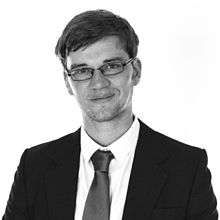William MacAskill
| William MacAskill | |
|---|---|
 | |
| Born |
William Crouch March 24, 1987 Glasgow, Scotland, UK |
| Alma mater |
Jesus College, Cambridge (BA) St Edmund Hall, Oxford (BPhil) St Anne's College, Oxford (DPhil) |
| Era | Contemporary philosophy |
| Region | Western philosophy |
| Institutions |
Emmanuel College, Cambridge Lincoln College, Oxford Future of Humanity Institute Giving What We Can 80,000 Hours |
| Doctoral advisor | Krister Bykvist and John Broome |
Main interests | Effective altruism |
|
Influences
| |
| Website | williammacaskill.com |
William MacAskill (born William Crouch;[1] March 24, 1987) is a Scottish philosopher, ethicist, and one of the originators of the effective altruism movement.[2][3] He is a research fellow at the Global Priorities Institute at Oxford.[4] MacAskill is the co-founder and president of 80,000 Hours,[5] the co-founder and vice-president of Giving What We Can,[6] and the co-founder of the Centre for Effective Altruism.[7] He is the author of the book Doing Good Better, Effective Altruism and a Radical New Way to Make a Difference.[8]
Career
MacAskill earned his BA in philosophy at Jesus College, Cambridge, his BPhil at St Edmund Hall, Oxford, and his DPhil in philosophy at St Anne's College, Oxford in 2013 (spending a year as a visiting student at Princeton University), supervised by John Broome and Krister Bykvist.[9] He then took up a junior research fellowship at Emmanuel College, Cambridge,[10] before taking an associate professorship at Lincoln College, Oxford.[11]
MacAskill’s research has two main focuses. The first addresses the issue of how one ought to make decisions under normative uncertainty; in addition to a DPhil on the topic,[9] he has published on this issue in Ethics,[12] Mind,[13] and The Journal of Philosophy.[14]
Doing Good Better and Effective Altruism
MacAskill’s second research focus is on effective altruism. His book on the topic, Doing Good Better, was published in 2015, and reviewed favorably in The London Review of Books,[15] The Guardian,[16] and The New York Times.[17]
In it, he argues that many of the ways people think about doing good achieve very little, but that by applying data and scientific reasoning to the normally sentimental world of doing good, opportunities to have a huge positive impact can be found.
In the book MacAskill makes controversial claims such as the fact that fair trade does very little to help the poorest farmers, that boycotting sweatshops might make things worse for the global poor and that people who pursue high-income careers such as plastic surgeons or wall street bankers could do more good than charity workers.
MacAskill's argument that young idealists should work for Wall Street has been the subject of a New York Times op-ed by David Brooks.[18] Brooks argued that, while effective altruists may start earning to give in order to realize their deepest commitments, their values may erode over time, becoming progressively less altruistic. In addition, Brooks objected to the view on which altruists should turn themselves "into a machine for the redistribution of wealth."
Talks and Media Appearances
In 2016, MacAskill appeared on the podcast “Waking Up” with Sam Harris,[19] as well as the “Tim Ferriss Show” with Tim Ferriss.[20]
In 2018, MacAskill gave a TED talk on effective altruism at the TED conference in Vancouver, the talk was released on the 12th of September, 2018.[21]
Personal Life
MacAskill (born Crouch) is also known for having argued that men should consider changing their last names when they get married; he and his fiancée changed their name to "MacAskill", her maternal grandmother's maiden name.[1]
He lives in Oxford.
Publications
- Doing Good Better - Effective Altruism and a Radical Way to Make a Difference. Guardian Faber, London 2015, ISBN 978-1-78335-049-0.
References
- 1 2 MacAskill, William. "Men Should Consider Changing Their Last Names When They Get Married". The Atlantic. Retrieved 2013-10-16.
- ↑ Thompson, Derek The Greatest Good The Atlantic. June 25, 2015
- ↑ Diver, Tony (1 March 2017). "While the papers whine about Oxbridge debauchery, student altruism gets ignored". The Telegraph. Retrieved 15 August 2017.
- ↑ "People". Retrieved 6 September 2018.
- ↑ "Meet the Team". Retrieved 2015-11-26.
- ↑ "The Team". Retrieved 2015-11-26.
- ↑ "The history of the term 'effective altruism'". Effective Altruism Forum. Retrieved 6 September 2018.
- ↑ William MacAskill (2015). Doing Good Better - Effective Altruism And a Radical Way to Make a Difference . Guardian Faber, ISBN 978 1 78335 049 0
- 1 2 MacAskill, William (2014). Normative Uncertainty (DPhil thesis). University of Oxford.
- ↑ "New People" (PDF). Oxford Philosophy Magazine. 2015. p. 7.
- ↑ "Members: The Senior Common Room 2015–16" (PDF). Lincoln College Record 2015–16. p. 9.
- ↑ MacAskill, William. "The infectiousness of nihilism" (PDF). Ethics. 123(3): 508–520.
- ↑ MacAskill, William (2016). "Normative Uncertainty as a Voting Problem". Mind. 125 (500): 967–1004. doi:10.1093/mind/fzv169. ISSN 0026-4423.
- ↑ MacAskill, William (2016). "Smokers, Psychos, and Decision-Theoretic Uncertainty". Journal of Philosophy. 113 (9): 425–445. doi:10.5840/jphil2016113929. ISSN 0022-362X.
- ↑ Srinivasan, Amia (2015-09-24). "Stop the Robot Apocalypse". London Review of Books. pp. 3–6. ISSN 0260-9592. Retrieved 2018-09-09.
- ↑ Shariatmadari, David (2015-08-20). "Doing Good Better by William MacAskill review – if you read this book, you'll change the charities you donate to". the Guardian. Retrieved 2018-09-09.
- ↑ "Effective Altruism: Where Charity and Rationality Meet". Retrieved 2018-09-09.
- ↑ Brooks, David. "The Way to Produce a Person". The New York Times. Retrieved 2013-10-16.
- ↑ "Waking Up Podcast #44 — Being Good and Doing Good | Sam Harris". Sam Harris. Retrieved 2018-09-09.
- ↑ Tim Ferriss (2016-01-04), Will MacAskill Interview (Full Episode) | The Tim Ferriss Show (Podcast), retrieved 2018-09-09
- ↑ MacAskill, Will, How can we do the most good for the world?, retrieved 2018-09-12